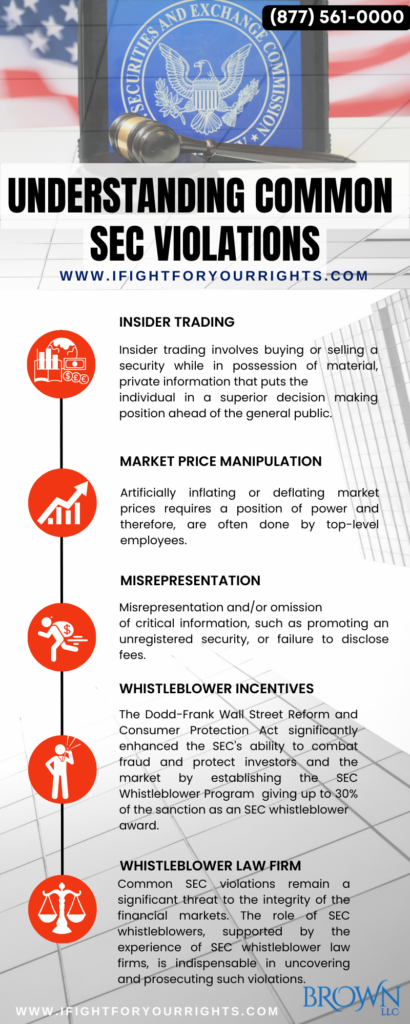Understanding Some Common SEC Violations

The Securities and Exchange Commission (SEC) plays a pivotal role in regulating the U.S. securities markets and enforcing federal security laws. Despite rigorous regulations, violations still commonly occur, affecting both investor profiles and financial market health. Among these, a few stand out as common and high-profile SEC violations: manipulating market prices, theft of funds or securities, destruction of audit trails and insider trading. After the economic recession of the 2000s, the United States created a mechanism for insiders to report these schemes before they spiral out of control and imbued in the the Dodd-Frank Act the SEC is incentivizing whistleblowers to provide inside information about misconduct and potentially stay anonymous for the entirety of the process with an SEC whistleblower lawyer. Here are some of the more common SEC violations explained.
Insider Trading
Insider trading involves buying or selling a security in breach of a fiduciary duty or other relationship of trust and confidence while in possession of material, private details. Insider trading is highly regulated by the SEC because it undermines investor confidence in the fairness and integrity of the securities markets.
Insider trading can occur at any level and across various fields. For instance, in 2022, the U.S Attorney’s Office of Southern New York charged a multitude of individuals ranging from a former U.S Congressman to tech executives with insider trading. Parties liable for insider trading commonly include corporate officers, employees, and any individuals who receive confidential information even if its inadvertent.
The notion of inside trading dovetails into an umbrella concern the SEC cares deeply about which is the fiduciary should not place its interests superior to the investor. Anytime the investor is held to higher fees for the sake of the profits of the financial entity when there’s a cheaper fee alternative or an inferior product for bigger commissions for the fiduciary, then the SEC may take action for subordinating the interest of the customer.
Market Price Manipulation
Market price manipulation is artificially inflating or deflating market prices to influence the price and create a result that financial companies can bank on or profit in to the detriment of others. This violation can materialize in many ways. One such practice is called “painting the tape,” an illusory practice in which traders falsely boost the perceived value of a security by means of buying and dumping the security, which is sometimes referred to as a pump and dump scheme. A permutation of market price manipulation as when there is concealment of detrimental facts about the fiscal health of the company such as in the 2001 Enron case, in which high-level executives hid financial data in order to falsify their market value.
Another common strategy of manipulation is “cornering the market.” In the hallmark case of Silver Thursday, the Hunt brothers attempted to hoard silver through means of futures contracts but failed because of intervention by the Federal Reserve. The Antitrust Division of the Department of Justice continuously monitors the market and reports to prevent such violations.
Manipulation can also occur through illusory bids and asks behind the curtain. Market makers and others can look beyond the actual buy and ask and see all the pending public orders. So for example, lets say a low volume stock is trading at $95 a share, and an entity wants to manipulate the market it puts a hundred million dollar sell order at $100 a share and everyone who can view it will know there’s tremendous selling pressure at $100 so it could cause the stock to stay depressed and other orders to wall up below the $100 so it doesn’t reach it pushing the stock down. However, sometimes, markets do what they want to do and if it touches that $100 mark and the seller pulls the hundred million dollar sell order it could be a sign of market manipulation as it was an illusory order meant to create an effect.
Speak with the Lawyers at Brown, LLC Today!
Over 100 million in judgments and settlements trials in state and federal courts. We fight for maximum damage and results.
Destruction of Audit Trails
In recent years, the SEC has really hit home that financial companies have an obligation to preserve communications made with its clientele so the SEC can audit what transpired. So the company must take affirmative steps to preserve all communications and eliminate back channel conversations like WhatsApp, WeChat and SnapChat to name a few.
Theft, Other Violations, and the Investigation Process
Theft of securities is the simplest out of the common violations, but other common infractions listed by the SEC include: misrepresentation and/or omission of critical information, breaching the duty of broker-dealers to ensure fair treatment of customers, and offering securities that are not registered. Another common problem is churning, which when an investment advisor blows through someone’s account putting them in and out of products just to churn them for a fee, and there’s also the concept of unsuitable investments. Unsuitability is purposefully directing individuals towards a product that’s incompatible with their stated or expected goals. For example, if an elder individual places their life savings with a financial company, they should have a conservative product that helps them accumulate some return on investment (ROI) but should avoid high risk products that could flame out and leave them with nothing.
If you’re aware from the inside of violations along these lines and want to know your rights as a potential SEC whistleblower, you should take advantage of a free, confidential consultation with a quality SEC whistleblower law firm. The complaint must be presented in the most digestible manner for the SEC as the TCR complaint program is overburdened, so it’s critical to hire an experienced SEC law firm. The firm can go over with you your rights and try to conceal your identity even from the SEC but present it in the best possible light. An SEC whistleblower attorney can help ensure confidentiality and can help you present the information in the best possible light.
Whistleblower Incentives
The SEC has always had whistleblower incentives, but in the wake of the aforementioned Enron case, trust in the market was deteriorating. In response, Congress passed the Sarbanes-Oxley Act (SOX) in 2002, which bolstered whistleblower and anti-retaliation legislation.
The Dodd-Frank Wall Street Reform and Consumer Protection Act, enacted in 2010, also significantly enhanced the SEC’s ability to combat fraud and protect investors and the market by establishing the SEC Whistleblower Program. This program increased the monetary awards for eligible individuals to over $1,000,000, or 10-30% of recovered funds. Whistleblowers should consult an SEC whistleblower law firm to ensure that they secure the greatest reward for their case possible.
Common SEC violations remain a significant threat to the integrity of the financial markets. The role of SEC whistleblowers, supported by the expertise of SEC whistleblower law firms, is indispensable in uncovering and prosecuting such violations. By providing a secure avenue for reporting and incentivizing whistleblowers with monetary awards, the SEC aims to deter misconduct and promote a fair, transparent, and efficient marketplace. The ever-changing nature of these regulatory bodies means that whistleblowers will always be necessary to catch wrongdoing.
The legal labyrinth of whistleblowing SEC violations calls for the need of a seasoned intermediary in the form of an SEC whistleblower attorney to ensure the justice is pursued and the best chance for a successful outcome is followed. Whenever the company has its own interests ahead of its clients there may be an actionable case, particularly if tens of millions are in play. Speaking with a law firm that has former Department of Justice alumni and offers free confidential consultations is a route you should proceed with to learn your rights if you’re thinking about filing an SEC whistleblower complaint or if you want to learn more about what constitutes an SEC violation.

